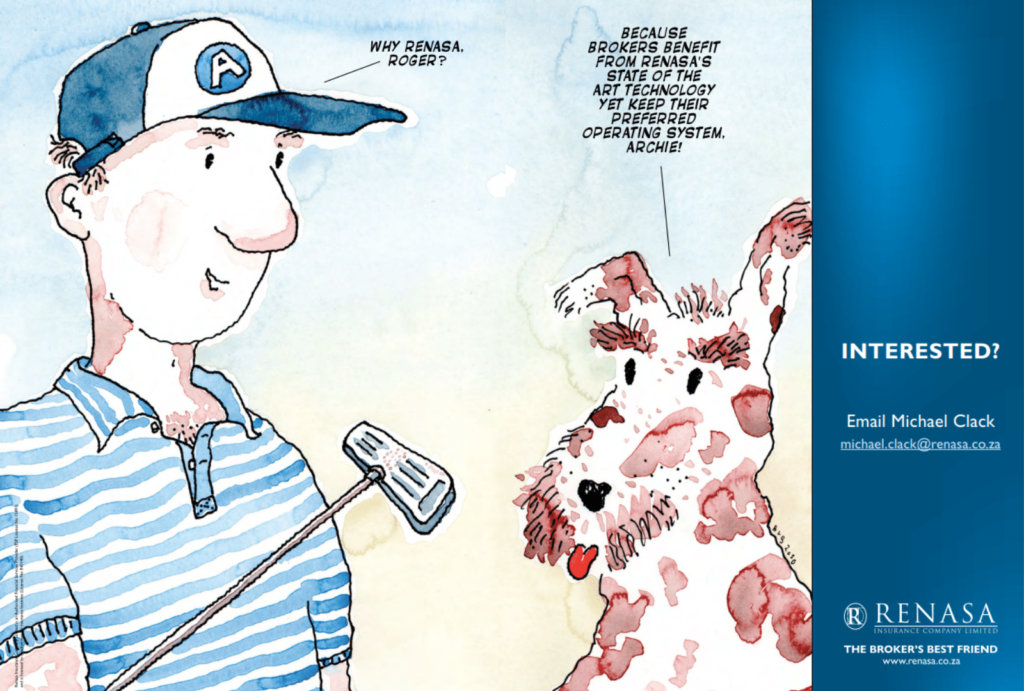It seems that the HCV space is a difficult environment to be in now and has been in the news quite a lot of late. This is part one of a conversation with Abrie Olivier, Managing Director, VAPs Insurance and Tyler Botha, Head of Claims, HCV, Renasa Insurance, about the very interesting topic of HCV insurance.

Tony: Abrie, to start off with, could you tell us about VAPs insurance and your range of products for heavy commercial vehicles?
Abrie: We are an innovative insurance underwriting company that specialises in Heavy Commercial Vehicle insurance or truck insurance and obviously, the related VAP insurance products, like excess reducer covers for mechanical breakdown and also personal accident covers for drivers. We started VAPs in 2015 and we are underwritten by Renasa Insurance Company Limited. We have grown in the past four or five years, but like you said, it is not an easy space to be in at the moment.
Tony: It may sound like a silly question to ask because it says heavy commercial vehicles, but what type of clients are normally the clients that you would insure?
Abrie: We insure clients for the loss or damage to trucks, commercial trailers, the big trailers that you see on the roads. We also do buses, and covers typically for accidents, fire, hail, thefts or hijacks. Typical clients that we insure include your long haul transporters and we insure a lot of bus operators, the big bus companies. We work a lot in the agricultural market, with what we call part time transport contractors. Then also the normal business owners with normal commercial policies that have some trucks in their fleet. So that’s typically the type of clients where we can assist intermediaries with insurance covers.
Tony: What sort of benefits are included in in your policy and is there anything specific that is not included?
Abrie: We have a long list of automatically included benefits like our cross-border towing and recovery. As you know, commercial policies limit towing cover after an accident to inside South Africa, so we have that extension. Our towing and recovery costs are anything up to R55,000, if an accident happens within South Africa. Included is obviously extended territorial limits. We can insure trucks going up to the DRC, to give you an example, so those territorial limits are included. Standard things like locks and keys and remotes up to R25,000. Then our third-party liability motor is included for two and a half million. We can also extend that up to seven and a half million.
Then optional extensions, which are very HCV specific. We’ve got an in house call centre, which we call the VAPs HCV assist line to provide 24/7 assistance to truckers. We do personal accident cover specifically for the driver and the co-driver, of up to R100,000. Then loss of use cover and obviously a big plus point or selling point for us, is the inception value policy, a policy that Renasa has been marketing for years. We are able to provide that policy to HCV’s specifically. That in a nutshell, is what we cover.
Tony: Then I would think that probably one of the most important developments in HCV over the last couple of years is telematics and risk management. How do you manage telematics and risk management from your perspective, and how do you get involved in that?
Abrie: The risks that transporters face these days is daunting in South Africa. It’s all over the news regularly, the N3 closes, the strikes and riots. To give an example, any single truck can travel as much as 15,000 kilometres a month, which is a major risk. We try and assist to minimise the risks, such as driver rest periods, the guys just get pushed too hard. In driver training we’ve got an agreement or an understanding with Kempston driver training. Telematics plays a huge role in assisting transport operators in managing these risks.
With modern telematics, we now know at any given point, how fast the driver is driving. With the video feeds that we get out of trucks, we can fit up to six HD cameras onto a truck these days. We can see what’s going on in front of a truck, inside the truck, to the back and sides. So, I think modern telematics is a game changer and it’s helping tremendously.

Tyler: Just to add on to what Abrie is saying, telematics goes far in trying to prevent losses. So, the whole reason behind it, is not just to see what the trends are, but to actually, in real time, try and prevent the loss.
So, if you have a driver that’s constantly speeding or has been driving for longer than eight or nine hours, you get hold of the client and say, there’s a potential risk.
We’ve had incidents where you have a blue light brigade that pulls over a truck, and the telematics operator immediately picked up that this wasn’t a normal policeman, because you could see the questions that were being asked or that the car wasn’t marked correctly. We then immediately inform the partners to send the Emergency Response Unit out.
We know there is a perception out there that we’re going to use a video to not pay a claim, but that’s never been the purpose of it. If the driver is not adhering to a certain law, that the camera can prove, we cannot act upon that against the policyholder. So it’s more about mitigating the risk or minimising the risk. We are in an era where to have a positive loss ratio, is a constant battle.
There are so many different factors from staff to towing and not letting the incorrect guy do the towing job by inflating the towing jobs. When it comes to clean-up on a site, you often have clean-up crews that overcharge and inflate because you’re not at the site, so you don’t know what’s going on. They will take a couple of photos, say there is a danger to the environment, and you’ll end up with R200,000 or R300,000 bill.
With all of these factors, we constantly need the telematics and the risk services to be involved, because it’s not a normal accident vehicle where it’s a personal lines client where he is standing next to his vehicle, knowing exactly how to act after an accident. He takes photos of his vehicle; he calls his broker or his insurance company and he logs it.
Usually, these are large accidents, where groups of people gather around to start looting. And you’ve got a possible third party that might be deceased or driver that’s deceased. So, you need help and the correct rigs out there. If the road needs to be closed off, we need to do that.
Apart from protecting the capital of the insurance company, we need to protect the insureds policy against high loss ratios, unnecessary excess that they need to pay. So, there’s a dual benefit on both sides by employing these risk services and telematics before events and after anything. I think that it has been the game changer by being more geared towards controlling the environment that we are constantly insuring.
Abrie: So, just as a last thought on that, I just want to say that we at VAPs, also created our own Risk Services Bureau. We have our own control room with people assisting clients, looking at computer screens, looking at trucks all day. So, that’s also an additional benefit that we offer our clients.


